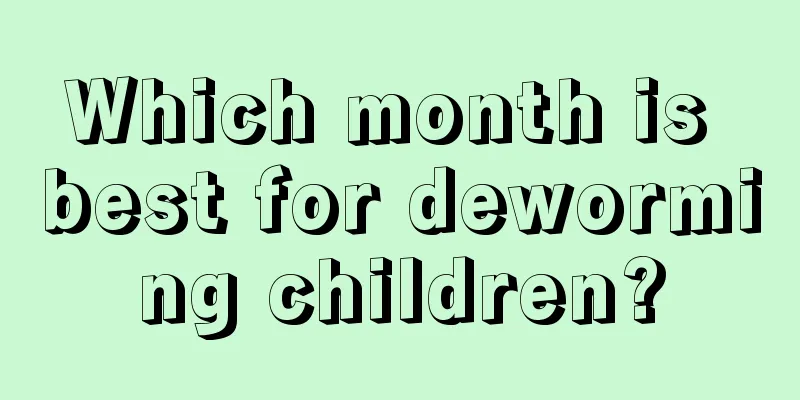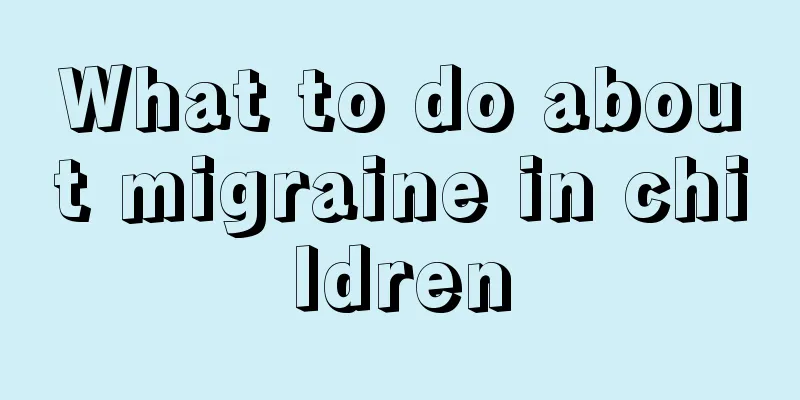Which month is best for deworming children?

|
Generally speaking, children under the age of seven can choose to deworm once or twice a year, which is good for the child's health. But which month is best for deworming children? Generally speaking, deworming can be done once in spring and once in autumn, which are more suitable times for deworming. But in principle it is okay all year round. There are also obvious symptoms when a child has worms in his stomach, such as grinding his teeth while sleeping at night and often complaining of stomachaches, but they go away after a while. If these symptoms occur, it is time to deworm. You can deworm at any time of the year, but the best time is in late autumn and early winter. The root cause is related to the peak infection season of parasite eggs and their evolution process. In summer, people like to eat cold dishes and raw fruits and vegetables, which increases the chances of ingesting parasite eggs. After the eggs invade the human body, they undergo a series of evolutions, and finally the larvae settle in the small intestine, where they continue to develop into adults, which takes about 2-3 months, just in late autumn and early winter. At this time, the climate is also good, and children can more easily tolerate the discomfort after taking deworming drugs. The newly grown parasites are still very fragile and easy to expel. Most of the various anthelmintics currently sold on the market can only expel adult insects, and are ineffective against larvae that are "traveling". Therefore, anthelmintics are most effective in late autumn and early winter. 1. The child often complains of stomach pain, especially around the navel, and likes to massage it. When it doesn't hurt, he still plays as usual; 2. Children are easily awakened, grind their teeth and drool during sleep; 3. There are often pale white, nearly circular or oval patches on the face and neck of children, with small grayish white scales on them, which are commonly known as "worm spots"; 4. The child's skin often has "wind bumps" (urticaria) repeatedly without obvious reasons; 5. The child has a poor appetite. Some children may have partial or unusual eating habits. They like to eat strange things such as paper and cloth. 6. Worms compete with children for nutrition in the intestines, which can affect their growth and development, leading to malnutrition and anemia; 7. When the larvae migrate, symptoms such as coughing, chest pain, asthma, difficulty breathing, fever, itchy skin, and increased eosinophilia in the blood may occur; 8. Adult worms in the intestines can cause complications such as parasitic intestinal obstruction, appendicitis, and peritonitis. In life, many parents judge whether their children have abdominal parasites based solely on whether the baby has "worm spots" on the face, whether the baby grinds his teeth at night, or whether he has abdominal pain and other symptoms. This practice is not scientific. "Worm spots" are a skin disease caused by a lack of B vitamins, medically known as simple pityriasis. Although the toxins secreted by roundworms can induce nocturnal bruxism, it can also be caused by mental stress, calcium deficiency, dental diseases, etc. It is unreliable because of its lack of specificity. As for stomach pain, there are more reasons, such as intestinal cramps, cold abdomen, enteritis and abdominal epilepsy, etc. Parasites are only one of the factors. The most reliable evidence of whether a child has worms is if the child has recently passed worms. If there is no history of worm excretion, a stool microscopic examination should be performed. If worm eggs are found, even if there is only one, it should be determined that the child has intestinal worms. For children, it is necessary to test their stool regularly to find out whether there are parasites in their bodies and what kind of parasites they are. |
<<: What medicine should children take if they don't have bowel movements?
>>: What to do if your child can't urinate completely
Recommend
How to treat amblyopia in children
The incidence of amblyopia in children is becomin...
How to develop children's intelligence
The intellectual development of children plays a ...
How to treat mycoplasma infection in children?
When children unfortunately suffer from mycoplasm...
What's going on when babies scratch their heads and faces?
The safe growth of babies in life is the biggest ...
Is circumcision good for children?
When children are six or seven years old, many pa...
How to treat children's tooth decay? Brushing teeth is also a science
Dental caries can be said to be the most common d...
Precautions for turning on air conditioning in the baby room
Because newborns have just arrived in a new envir...
Can I turn on the air conditioner when my baby has a fever?
We all know that the weather is very hot in summe...
What should I do if my baby has mild anemia?
Once there is a little problem with the child'...
What are the symptoms of chronic pharyngitis in babies?
When we suffer from pharyngitis, our throat will ...
Four-month-old baby's brain development
For four-month-old babies, they have just started...
Treatment of clubfoot in newborns
We may have all seen the situation of inversion o...
What should I do if my child has poor sleep quality?
If children have poor sleep quality, then parents...
How to treat stuttering in children?
Children often encounter various problems during ...
Causes of neonatal colic
A pregnant mother goes through ten months of hard...









